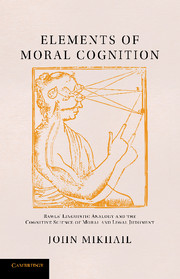
-
Select format
-
- Publisher:
- Cambridge University Press
- Publication date:
- September 2011
- June 2011
- ISBN:
- 9780511780578
- 9780521855785
- 9781107680371
- Dimensions:
- (228 x 152 mm)
- Weight & Pages:
- 0.8kg, 432 Pages
- Dimensions:
- (229 x 152 mm)
- Weight & Pages:
- 0.63kg, 432 Pages
- Subjects:
- Ethics, Philosophy
Book description
Is the science of moral cognition usefully modelled on aspects of Universal Grammar? Are human beings born with an innate 'moral grammar' that causes them to analyse human action in terms of its moral structure, with just as little awareness as they analyse human speech in terms of its grammatical structure? Questions like these have been at the forefront of moral psychology ever since John Mikhail revived them in his influential work on the linguistic analogy and its implications for jurisprudence and moral theory. In this seminal book, Mikhail offers a careful and sustained analysis of the moral grammar hypothesis, showing how some of John Rawls' original ideas about the linguistic analogy, together with famous thought experiments like the trolley problem, can be used to improve our understanding of moral and legal judgement.
Reviews
‘Judicious, carefully executed, and deeply informed, this valuable study builds upon the early work of John Rawls, including his now-classic Theory of Justice, identifying its core principles, persuasively defending them against critics, deepening them conceptually and developing rich empirical foundations. It thereby provides the outlines of a naturalistic theory of moral judgment and moral cognition, which may well be a common human possession. One conclusion with broad consequences is that moral cognition crucially relies on the generation of complex mental representations of actions and their components. Mikhail’s enterprise resurrects fundamental themes of traditional moral philosophy and Enlightenment rationalism, while showing how they can be cast as empirical science with far-reaching implications for political, social, and legal theory. It is a most impressive contribution.’
Noam Chomsky
Contents
Metrics
Altmetric attention score
Full text views
Full text views help Loading metrics...
Loading metrics...
* Views captured on Cambridge Core between #date#. This data will be updated every 24 hours.
Usage data cannot currently be displayed.
Accessibility standard: Unknown
Why this information is here
This section outlines the accessibility features of this content - including support for screen readers, full keyboard navigation and high-contrast display options. This may not be relevant for you.
Accessibility Information
Accessibility compliance for the PDF of this book is currently unknown and may be updated in the future.


